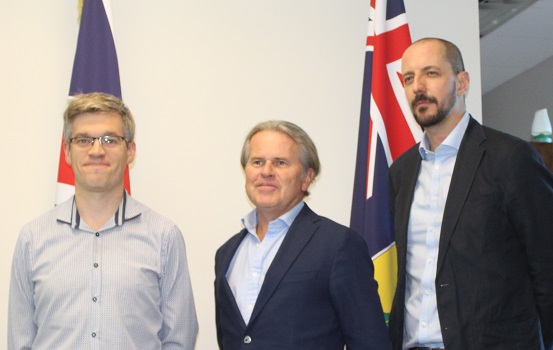#TurksandCaicos, September 30, 2021 – It was described as 14 days of a significant engagement with the United Kingdom and included from military exercises to parliamentary training to high level talks with government officials, Governor Nigel Dakin reports on a string of encounters which shore up border protection, hurricane readiness, parliamentary procedure, good governance and helps the UK to gain a more intimate understanding of its Overseas Territories.
One of the vital sessions welcomed the Governors of Anguilla, Bermuda, British Virgin Islands and Montserrat to TCI to attend a Caribbean Governor’s conference chaired by the Director of the Foreign Commonwealth and Development Office’s Overseas Territories Directorate and joined by video link was the Governor of Cayman. Governor Nigel Dakin, in a media report explained: The Director, Paul Candler and the Deputy Director Adam Pile of the FCDO’s Overseas Territories Directorate came to TCI not only to host this conference but also to spend time understanding the Turks and Caicos Islands and they were accompanied by a UK Government Economist, Samuel Edwards.
“As a Governor – who is now entering his third year – it was also striking to me that in almost every conversation, with every sector of society and community, and every stakeholder in its future, the importance around issues of ‘identity’, expressed from very different perspectives, and every different perspective, were raised by those speaking to our visitors. It impacts on opportunities linked to wealth creation, employment, health, education, child safe-guarding, policing, security, long term stability and much else,” said Nigel Dakin, TCI Governor on the day of departure for the team.
The team visited Her Majesty’s Prison in Grand Turk, saw the TCI’s coastline from air, land and sea through which they got exposure to the boom in top end construction sector, said Governor Dakin, and through to the unregulated settlements of Dockyard.
They got a feel for the scale of maritime protection, Environmental officers took them out on patrol.
The report from the Governor’s Office informed: “ Hosted by the Governor, and newly appointed to his role, this was Mr Candler’s first visit to an inhabited overseas Territory and it was not coincidental he chose TCI first. The success that TCI has enjoyed over the last 18 months, weathering the initial period of the pandemic from a health perspective, rolling out the vaccines to deliver a rate of over 70%, the significant rebound of the economy and the fact it may emerge from the pandemic stronger than it entered, suggests that much is going well in TCI and there are underpinning fundamentals that TCI has worked hard to embed, over the last decade, that are worth learning from in the UK Governments relationships with other Overseas Territories. The optimism for the future was, Mr Candler said, ‘palpable and real’.”
Meetings were had with the Premier and his Cabinet; the Deputy Governor and Attorney General, Leader of the Opposition and the Opposition’s Appointed Member and time was spent time with ‘Team Finance’, ‘Team Health’, and DDME including the UK military liaison officer. There were sessions with NGO’s; good governance bodies; leaders in TCI’s industry and business; child safe-guarding; the Governor’s appointed members; all the Permanent Secretaries; the Justice Stakeholders Group, the Press and the Youth of the Turks and Caicos Islands.
“Over the last week this well-founded ‘hope’ for our future prosperity yet also this ‘fear’ around who is – and who is not – part of the future TCI nation – seems to me to mark TCI out as an Overseas Territory different from the rest. The positive point, on the latter, was how respectful to different positions each person who raised this had been, and I believe our visitors would have been struck by the constructive tone of the debate they heard, most particularly from the younger generation that they met. That’s particularly apposite as I write this on national youth day.”
It was an ambitious agenda which spanned a week, and started on September 16, with the arrival of another batch of UK-gifted, Covid-19 vaccines.
“The British Airways flight they arrived on included the fifth batch of vaccines from the UK Government. They were briefed in detail on National Security, Policing and Crown Land. Calls were made on the Maritime Police, Radar, the Port and the Detention Centre, Hospital and National Laboratory.”
The trio departed as they came on a British Airways flight on Thursday September 23.


 News6 days ago
News6 days ago
 Caribbean News7 days ago
Caribbean News7 days ago
 News6 days ago
News6 days ago












